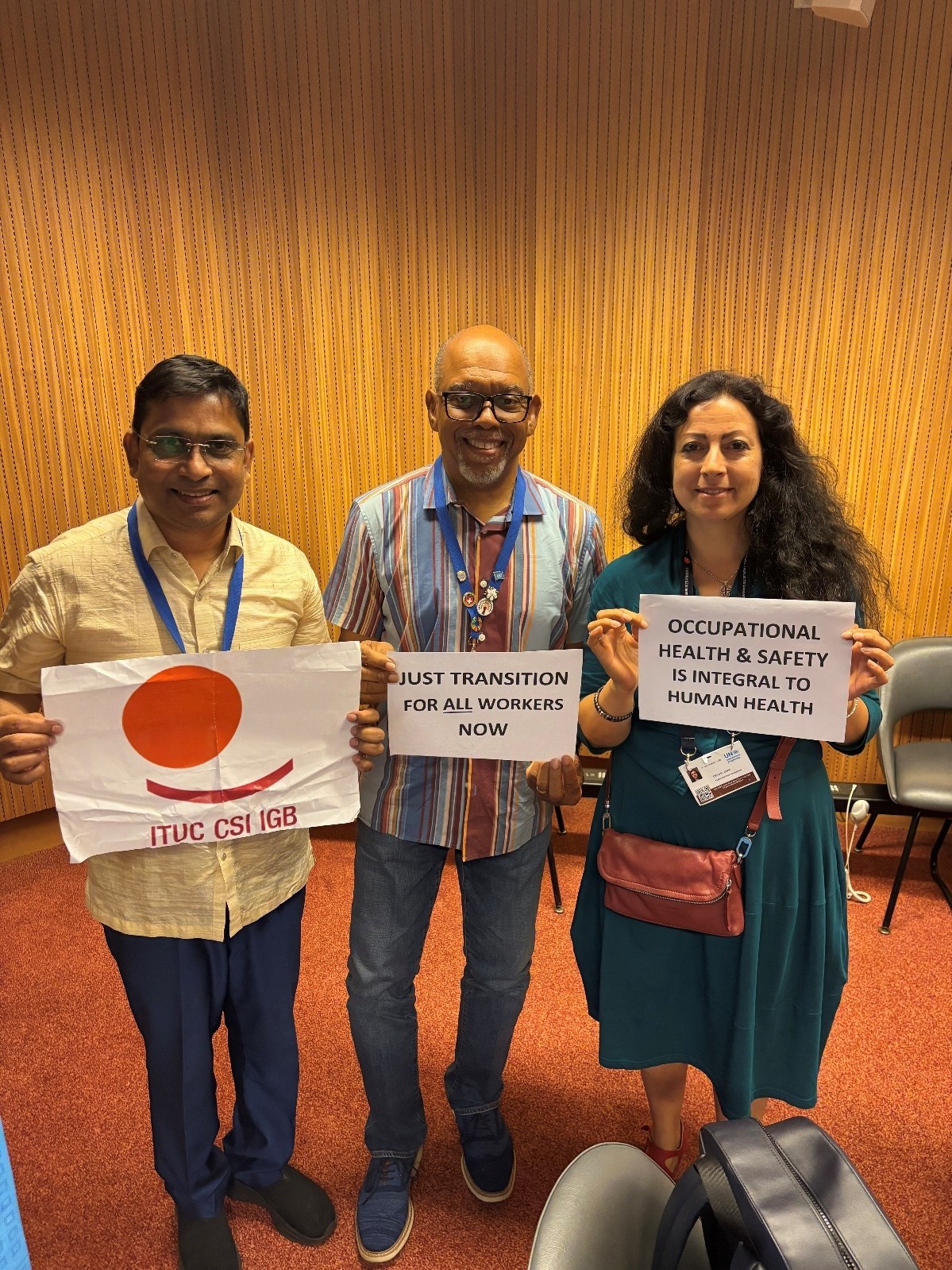Occupational Health and Safety PSI-ITUC delegation puts labour issues high on the plastic treaty negotiations despite oil states and corporations blockage
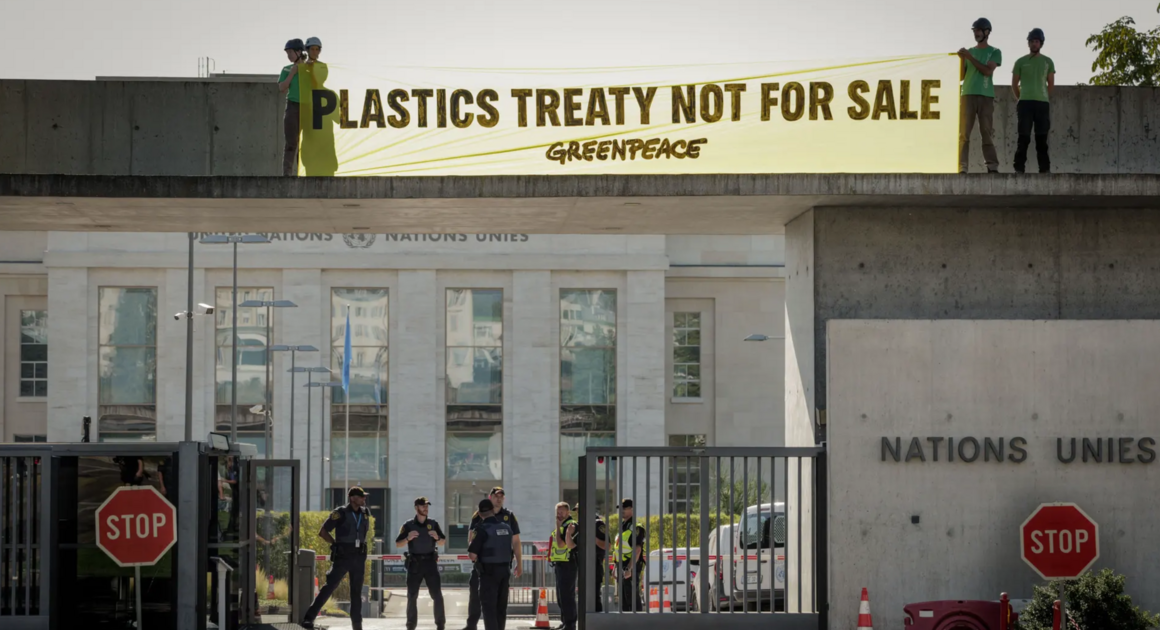
Oil states and corporate vested interests prevailed once more, blocking the process during the last round of negotiations that should have delivered an ambitious UN international treaty to address the global scourge of plastic pollution by 2040 and to protect human health and the environment.

Daria Cibrario
A joint PSI-ITUC delegation represented global labour during the negotiations, relentlessly advocating for labour rights, occupational health and safety (OSH), decent jobs in waste management services, just transition for all workers involved and adequate public investment in waste and water infrastructure.

Where did the Geneva negotiations pick things up from INC-5.1 in Busan 2024?
The second part of the fifth session of the Intergovernmental Negotiating Committee to develop an international legally binding instrument on plastic pollution, including in the marine environment (INC-5.2), took place from 5 to 15 August 2025 at the Palais des Nations in Geneva, Switzerland, under the umbrella of the UN Environmental Programme (UNEP) and the mandate of UNEA resolution 3/7 (2017) on marine litter and microplastics. It was attended by over 2,600 delegates, representing 183 Member States and 400 observer organizations, including environmental groups, labour, Indigenous Peoples, as well as fossil fuel and chemical industry lobbyists.
A ministerial side meeting held on 12-13 August 2025 brought to Geneva more than 70 Ministers and Vice Ministers, as well as 30 other high-level representatives, to add political momentum to the negotiations and facilitate an agreement.
This process resumed the first part of the Fifth Session (INC-5.1) held in Busan (South Korea) from 25 November to 1 December 2024, where states had already failed to reach consensus. The main goal of the INC-5.2 was to conclude the INC-5.1 negotiations that were technically suspended and failed to reach consensus on a text. The result was the Chair’s Text (1 December 2024), a baseline reflecting a basic skeleton of the most consensual issues which emerged from the Busan’s discussions on which to build the text of the international agreement at a later stage.
The Chair’s text reflected the results of the advocacy carried out by PSI and the ITUC since 2022 to ensure an acknowledgement and a comprehensive reference to all workers along the plastic supply chain in the Preamble; a clear mention and a dedicated article on just transition (Artt. 8 and 10); public investment in waste management infrastructure and staffing – including at a subnational government level (Artt. 8a; 12.1); as well as and safe water and sanitation systems (Art. 11). While seriously incomplete, this text was a starting point all parties looked at as a promising stepping stone towards a much awaited, ambitious and effective agreement.
What happened at INC-5.2 negotiations in Geneva ?
The negotiations were conducted in four contact groups responsible for different sections and articles of the draft treaty alternating with plenary sessions meant to take stock of progress and consolidate agreed language. Contact group work was regularly obstructed and slowed down by some delegates with procedural questionings and by convoluted discussions on matters of little substance. Contact group sessions, informal discussions and regional group meetings were scheduled from sunrise to late night, including during part of the weekend, This resulted in a difficult situation for small delegations unable to cover all relevant sessions and creating stress and exhaustion among participants working round the clock.
The negotiation process was such that observers from civil society, scientists, trade unions and experts - including from other competent UN agencies - had no opportunity to be heard directly during the contact group discussions, which led to serious shortcomings on technical matters including health, environmental, OSH, social and labour issues, and on the best options for the regulation of the production and use of chemicals of concern and toxic additives employed in the plastic life cycle. This lack of expertise on technical matters combined with diverging views among countries on the scope (downstream only vs. whole life-cycle approaches, environmental only vs. human health dimension), methods (compulsory cap on extraction and production vs. voluntary targets), and means of implementation for the instrument (financing and governance) - together with the deliberate political willingness to stalemate the process by a minority of oil and plastic producers that weaponised consensus-based decision-making - led to the failure of the negotiations.
Although INC-5.2 was meant to end on 14 August, negotiations finished at 9 am on 15 August with no outcome after a long and confusing night with little information between plenary sessions. As contact groups failed to comprehensively deliver agreed text to beef up the overall draft text agreement, the INC Chair proposed a new Chair’s draft text (13 August 2025) as a new working document towards a final text. However, this new draft was widely rejected and triggered strong criticism from high ambition countries during the Plenary session of 13 August 2025, as it did not contain binding measures to cap production and regulate chemicals of concerns, was lacking a specific article on health; and largely left every measure to the goodwill of individual states. As a result, a revised Chair’s text proposal was circulated in the night of 15 August 2025 00:48 am and an additional plenary session was convened at 6.12 am on 15 August 2025. The plenary ended at 9.11 am of the same day and negotiations were once more suspended and adjourned to a later date and venue to be determined.
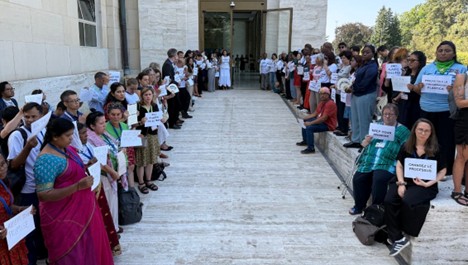
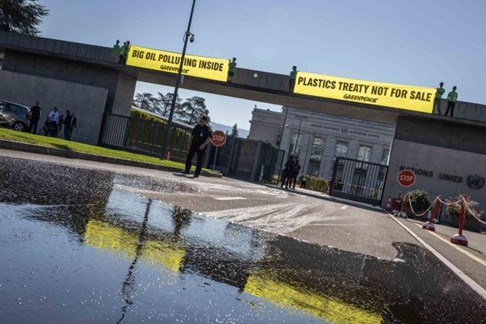
This failure occurred despite a strong collective momentum in favour of an ambitious instrument built by a majority of nations (about 100 countries have expressed themselves in favour of some form of production cap) and civil society. Against the backdrop of the urgency of addressing global plastic pollution and the deadlock of consensus-based multilateralism, civil society groups and even some states called for a change to the rules to overcome stalemate, democratise the process to ensure the meaningful participation of right-holders and stakeholders; and to establish stringent conflict-of-interest vetting to halt the penetration of corporate interest and capture of public institutions.
Why are the plastic treaty negotiations important for public service workers?
Plastic pollution is one of the biggest challenges of our time. Out of the 8.3 billion tons of plastics produced since the 1950s, 79% ended in landfills or leaked into the environment. A major threat to public health and the environment and a critical root cause of biodiversity loss and climate change, plastic pollution - including under the form of micro- and nanoparticles - are now found everywhere on the planet, including in the poles and in deep waters, in unborn children’s placentas and in our brains. They have contaminated the full food chain and water cycles and are virtually impossible to remove. Although plastic is an incredibly practical and versatile material, it is made from fossil fuels and currently produced with thousands of chemical compounds and additives whose short and long-term impact on human health and the environment remain largely untested and unregulated. Less than one percent of plastic chemicals are regulated internationally. Emissions of microplastics to the environment are estimated to be up to 40 megatons per year, an amount that could double by 2040 if no action is taken.
Video
The Story of Plastic is a searing exposé revealing the ugly truth behind plastic pollution and the false solution of plastic recycling. The Story of Plastic presents a cohesive timeline of how we got to our current global plastic pollution crisis and how the oil and gas industry has successfully manipulated the narrative around it.
The Story of Plastic
PSI affiliates represent workers in waste collection, management and disposal; water and sanitation; as well as in fire service and public emergency services (PES). These workers are on the forefront of the downstream part of the plastic supply chain and are also among the most exposed to the effects of chemicals and additives in plastic materials. In addition, nurses, midwives, social care workers, firefighters and public emergency workers use plastic products daily, which can contain chemicals of concern and toxic additives.PSI also represents regulatory inspectors and scientists in public environmental and health agencies.
The 2017 ILO report “Hazardous Exposures to Plastics in the World of Work” found that open burning of plastic waste due to the lack of adequate, safe waste management and disposal infrastructure, resulted in increased exposure to toxic substances, such as acid gases and ash, which can contain persistent organic pollutants, especially for waste workers in developing countries. A recent IPEN study on the chemical exposures of workers in waste management and recycling launched during the INC5-2 negotiations, shows that in Thailand, waste workers are exposed to at least 21 chemicals of concern, and in Kenya to 30. These include phthalates, polycyclic aromatic hydrocarbons (PAHs) and organophosphate flame retardants (OPFRs), all chemicals which are linked to neurodevelopmental issues and endocrine disruption.
Strong PSI engagement on the plastic treaty process since 2022
PSI and its affiliates have recognised the importance of the INC negotiations from the onset and have taken a proactive stance advocating for public service workers and global labour rights since INC-2 in Paris (2022); INC-3 in Nairobi (2023) and INC-4 in Ottawa (2024). PSI has strongly engaged in the INC process and advocated for the inclusion of occupational health and safety considerations (OSH) in the negotiations and text of the INC, a dimension largely neglected even within the lively debate around human health during the negotiations.PSI also recognises the critical connection between the climate crisis and plastic production and pollution. PSI affiliates AGOEC (Argentina), TALGWU (Tanzania), CLOGSAG (Ghana) and CUPE (Canada) were actively involved in this advocacy. As a result, the ILO stepped up its own advocacy on the inclusion of OSH in the agreement.
Subsequently, on 19 February 2025 PSI’s Senior Policy Officer was invited together with Marcos Orellana, Special UN Rapporteur on toxics and human rights, to provide expertise and make a written submission to the OHCHR from a labour perspective on the “Implications of plastic pollution for the full enjoyment of human rights” at the 33rd session of the Human Rights Council Advisory.
PSI and ITUC actions, advocacy and coalition building during INC5.2
The global labour delegation at INC-5.2 led action and organised relentless advocacy and strategic coalition-building all along the process.
On 3 August 2025, PSI joined the International Pollutants Elimination Network (IPEN) INC-5.2 preparatory session, consolidating the alliance between organised labour and groups active on human and environmental health as well as engaged scientists, agreeing on the importance to have references to OSH as part of the protection of human health.
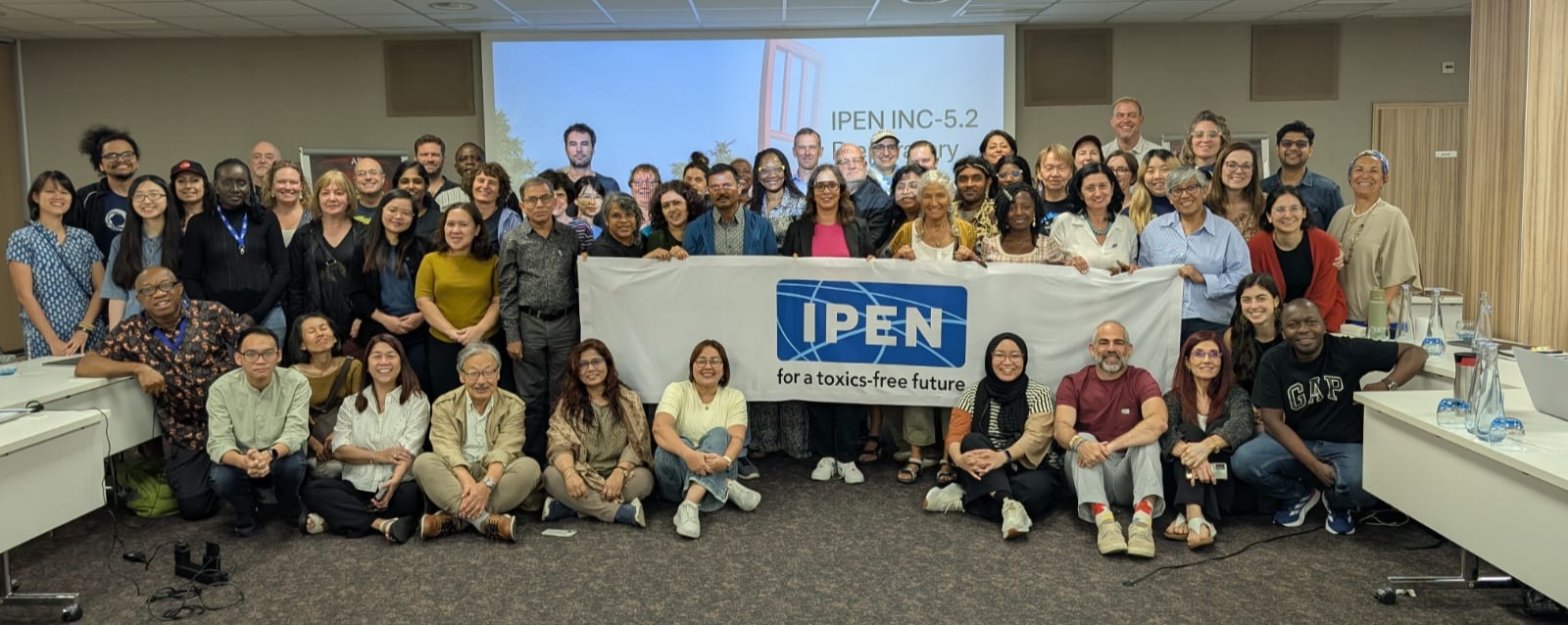
On 4 August 2025, one day before the kick-off of INC-5.2 official negotiations, PSI took the floor during the Conversation with Observers and addressed the UNEP Executive Director Inger Andersen and the INC-5.2 Chair Ambassador Luis Vayas Valdivieso. In her intervention the PSI representative highlighted the fact that the shortcomings with respect to the world of work of the text and the critical importance of fixing them for the success of the Treaty.
“We demand an explicit mention in the text to “Occupational Health and Safety (OSH)”, which is integral to the core objective of the treaty: the protection of human health and of the environment. The instrument cannot effectively protect human health if OSH is not mentioned and meaningfully addressed in the text”.
Daria Cibrario, Senior Policy Officer, PSI
Video
PSI Intervention: Conversation with Observers ahead of INC-5.2
On the same day, PSI represented the global labour movement in the Panel on "Perspectives from the World of Work" at the Multistakeholder Forum at the Plastics Treaty INC-5.2 facilitated by the Government of Switzerland. PSI joined the ILO, the Government of Brazil, the International Alliance of Waste Pickers (IAWP), the Indigenous People’s Caucus and the International Organisation of Employers (IOE) in the panel.
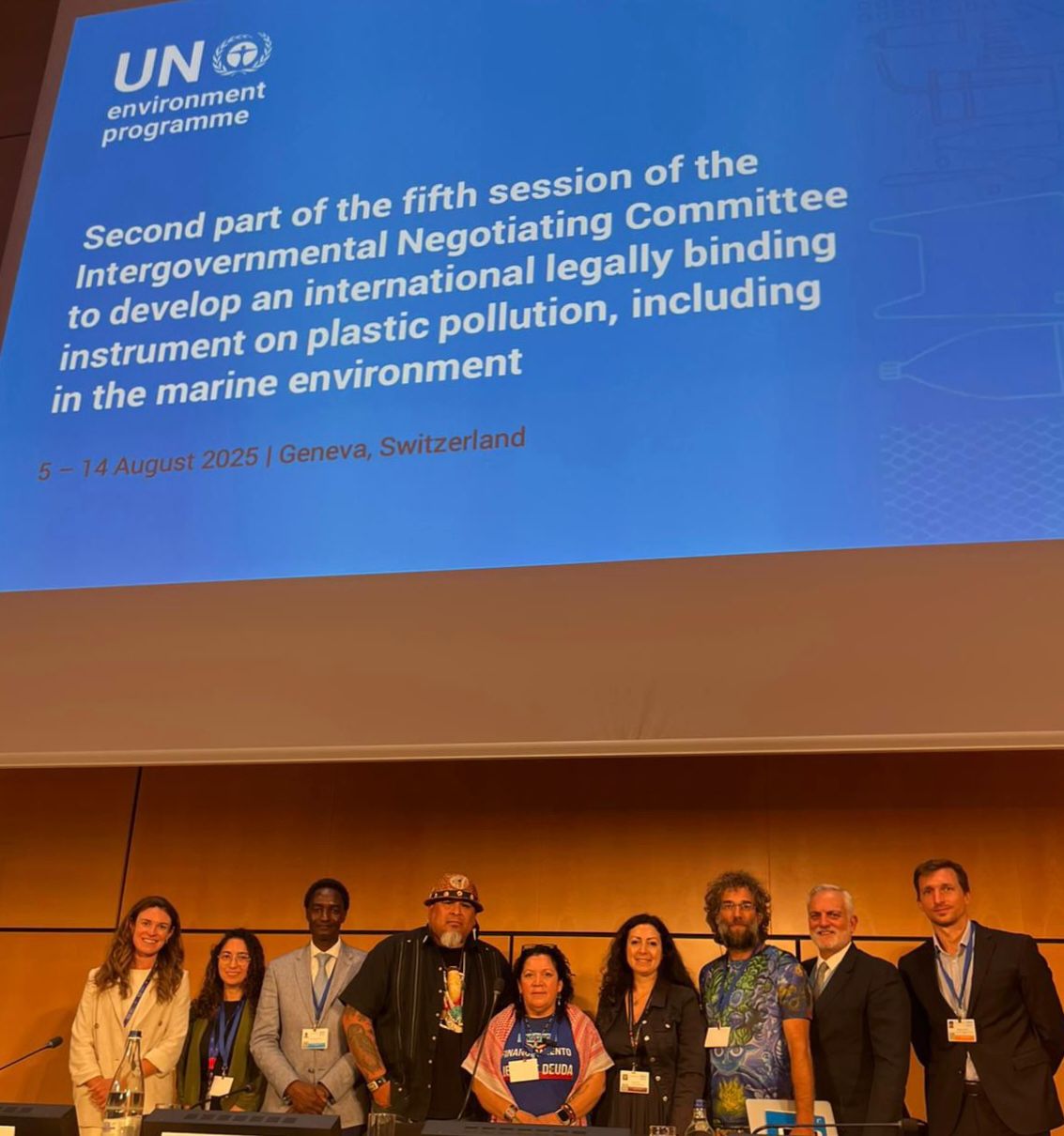
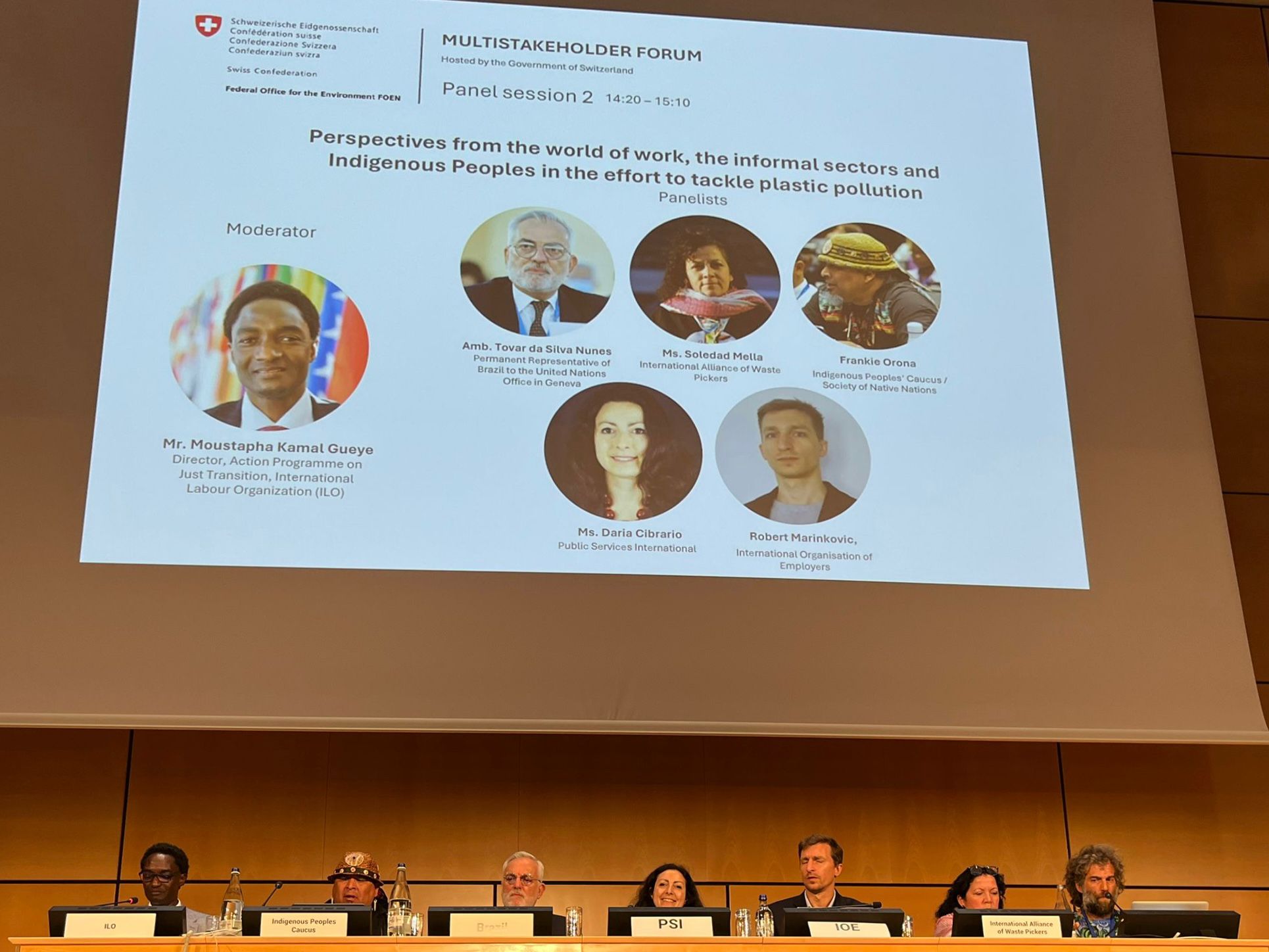
In her contribution, the PSI representative insisted on the critical importance of consistently including in the Treaty's text precise language and mechanisms to properly address social and labour issues, encompassing:
“all workers along the full lifecycle of plastics, in all forms of employment including waste pickers and other vulnerable workers”
"occupational safety and health (OSH)" and references to ILO OSH C155, C187, and C170
legally binding provision for Just Transition, with a requirement for National Just Transition Plans, a dedicated Fund and Trade Union participation
public investment – raised through taxing polluters – to (re)build adequate waste, water and sanitation infrastructure and fund decent job creation, including through the polluters’ pay principle and tax justice measures.
“The workers PSI represent are directly exposed to the hazards of plastic pollution and its toxic chemicals and additives either because plastics makes up their working tools, uniforms and protective gears; and/or because the removal and safe disposal of waste – including plastic waste - is part of their daily jobs. Many of them work in extremely dangerous and poor working conditions, even when they are technically considered as “formal” – but in many countries there is a large grey area between “formal” and “informal” employment” . This is why we continue to ask that the reference in the Preamble and in the other relevant sections of the text should be consistently to “all workers along the full lifecycle of plastics, in all forms of employment be them in the formal or informal economy, including waste pickers and other vulnerable workers. There should not be an overfocus on the downstream part of the supply chain only.” Daria Cibrario, Senior Policy Officer, PSI.
In the afternoon of 4 August 2025, PSI called on ITUC and GUF colleagues to join a demonstration organised by Greenpeace calling for an ambitious plastics treaty.
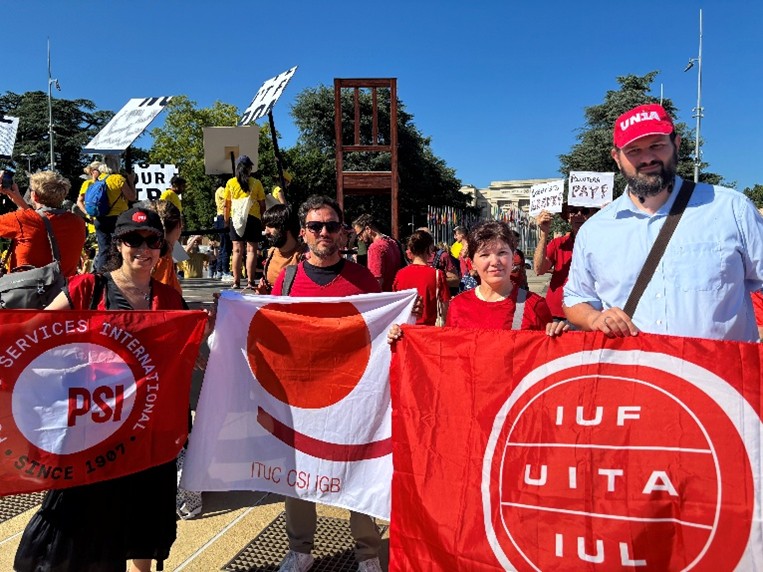
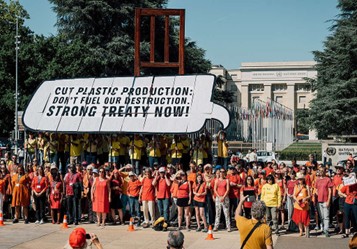
In the afternoon of 5 August 2025, PSI made a submission at the opening plenary of INC-5.2 on behalf of the Workers and Trade Union’s Major Group, demanding – among others – that “the treaty includes explicit references to social dialogue, workers’ organisations, social partners and collective bargaining as institutional pillars for the implementation of a Just Transition, as required by the current international normative framework”.
In the morning of 6 August 2025, PSI joined the advocacy action of No Plastics in My Sea, to sensitise INC-5.2 delegates and the general public to the critical role of ensuring access to quality public water and sanitation services is key to cut plastic pollution worldwide. PSI and EPSU joined the organisation’s “Call to support universal access to water services and to stop plastic bottles expansion” endorsed by over 130 signatories ahead of the negotiations.
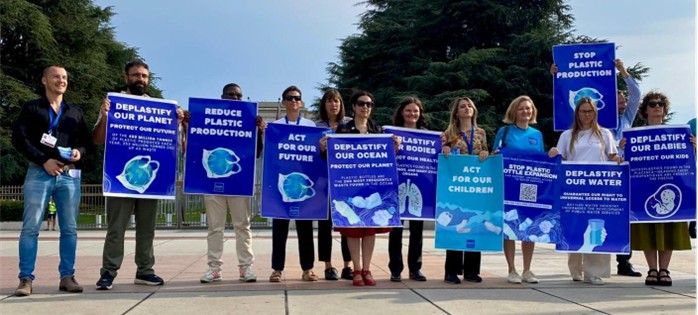
“A bold vision for a world without plastic pollution must necessarily include adequate, public investment in quality water and sanitation facilities that must be safe for users, workers and the environment. If there is one single thing that can cut plastic waste by tons right away is direct access to safe, drinkable water in homes and communities. What we need is PUBLIC water, not PLASTIC water”. Daria Cibrario, Senior Policy Officer, PSI.
On 7 August, PSI endorsed the analysis conducted by the Center for International Environmental Law (CIEL) on the corporate capture of INC-5.2 negotiations that found that fossil fuel and chemical industry lobbyists outnumbered the combined diplomatic delegations of all 27 European Union nations (233); and that 19 fossil fuel and chemical lobbyists were accredited as national delegates.
“Millions of workers are exposed to chemicals of concern and toxic additives along the whole plastics life cycle, including frontline workers in municipal waste management, water and sanitation facilities, as well as healthcare workers and firefighters. The CIEL report exposes the reality of the corporate capture of our national and multilateral institutions, and substantiates our call for urgent change. Polluters need to be held accountable for the healthcare and environmental burden they place on societies and must pay back through fair taxation as per the implementation of the polluter pays principle. We urge UNEP and Member States to resist pressure from polluters and support an ambitious treaty that protects both workers and the environment”. Daniel Bertossa, General Secretary, Public Services International (PSI) Global Union.
During the negotiations, PSI and the ITUC joined the ILO and the IOE as social partners meeting government delegations to secure the just transition article and to link it to the ILO concept enshrined in the Just Transition Guidelines.
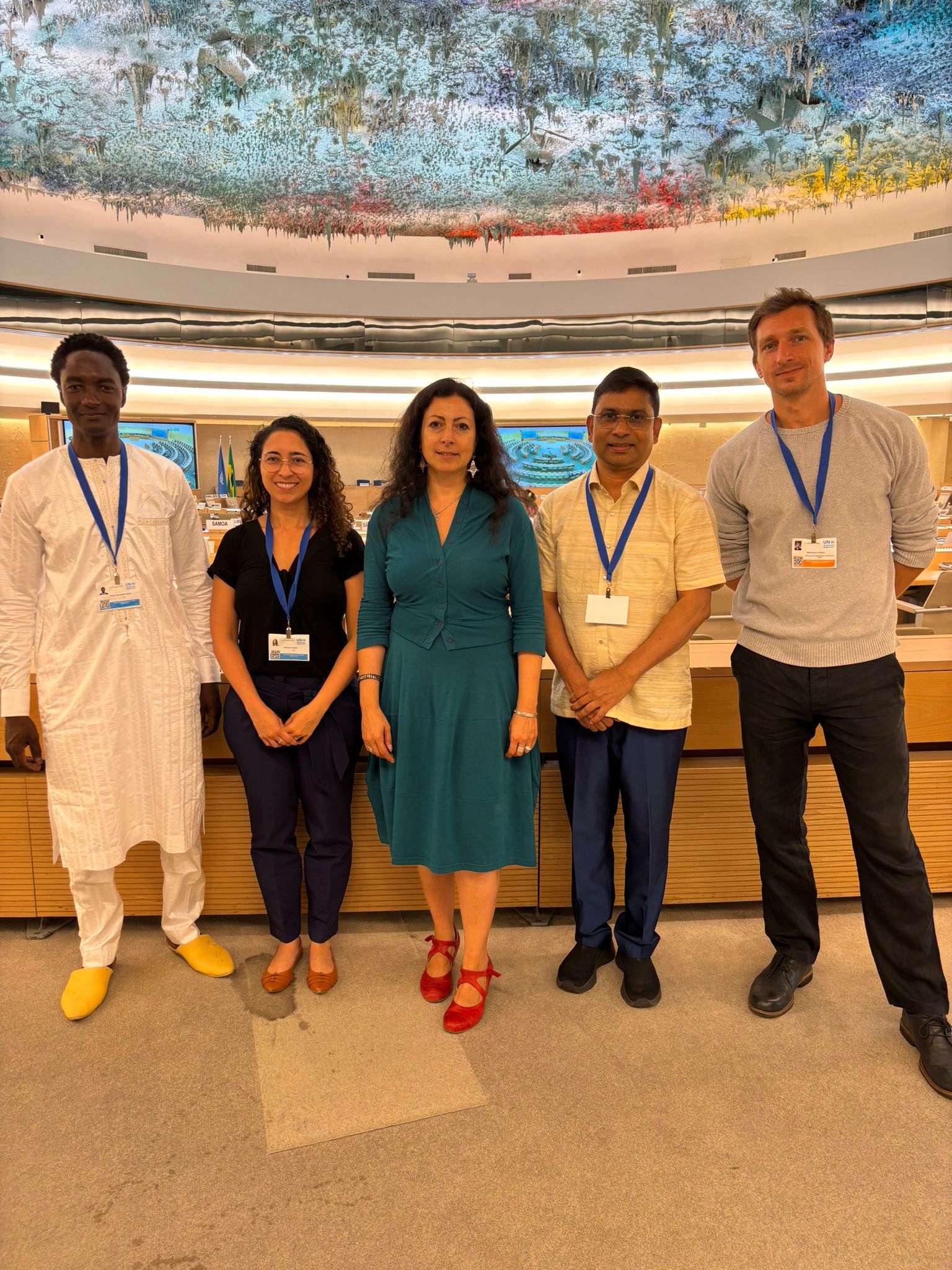
PSI also joined two informal debates with delegates organised by the Scientists’ Coalition for an effective Plastic Treaty, the WHO and Health Care without Harm to raise the issue of the inclusion of OSH in the future treaty.
The ITUC also spoke at two press conferences in the UN space organised by the Just Transition Coalition Alliance on 8 and 13 August 2025.
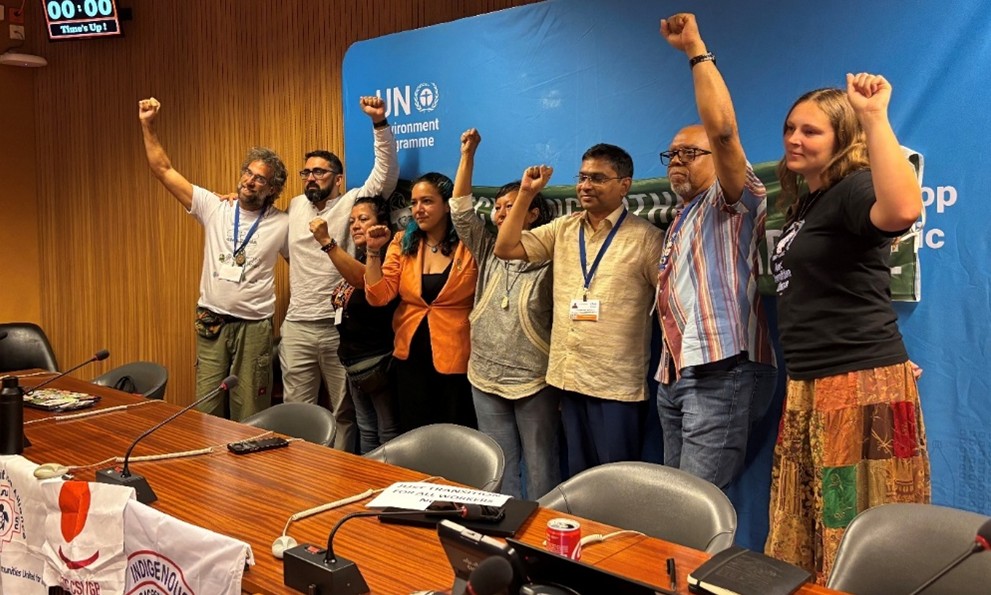
In his intervention on behalf of the Global Labour Movement Repon Chowdhury, ITUC, said:
“Just Transition measures especially include - among others - active labour market polices to create new decent jobs into which to guarantee the transition of workers all along the life cycle of plastics so they can maintain and improve their income and livelihoods. All states need to take the responsibility for the human, labour and social rights for their own populations and for ensuring decent work and livelihoods for their own workers employed along the full life cycle of places, be them in the formal or in the informal economy, including waste pickers, indigenous, and other vulnerable workers, as per their international commitments under international labour law and their membership to the ILO”. Repon Chowdhury, ITUC.
What happens next?
Officially, the INC is not over and has agreed to reconvene at a date and in a place to be yet determined. It is yet unclear if the latest version of the Char’s text will represent a future basis for negotiation and if there is any chance consensus-based decision-making will be challenged in favour of a coalition of the willing. In the meantime, some progressive LRGs are going ahead with banning some obvious plastic products. For instance, the state of South Australia has just banned a number of single-use plastic products, including the iconic fish-shaped soy sauce containers provided with takeaway sushi.
Although this latest version does not contain a proposal for a binding cap on plastic production and regulation of chemicals of concern, it sets a more ambitious tone stating upfront that plastic production levels are currently unsustainable and that international coordinated action must be taken. In terms of social and labour issues no substantial changes from the previous draft were made although the Just Transition article changed from Art. 10 to Art. 9. However, the reference to “indigenous” workers and communities were removed from the text, which is a major concern. PSI and the ITUC have advocated for the acknowledgement of waste pickers and indigenous workers within the category of vulnerable workers dealing with plastic pollution and will relentlessly continue to do so.
